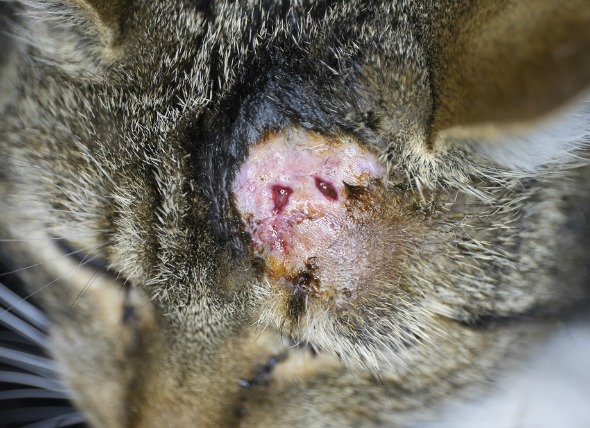
Cytauxzoonosis is a parasitic infection of the blood vessels of the cat's lungs, liver, spleen, kidneys, and brain. The protozoan parasite Cytauxzoon felis can also infect bone marrow and the developmental stages of red blood cells, thereby causing anemia. An uncommon disease, cytauxzoonosis typically affects feral and domestic cats in the south-central and southeastern United States.
Symptoms associated with cytauxzoonosis are usually severe, including:
The parasite is transmitted from the bite of an infected ixodid tick, which are known to roam in areas shared by reservoir hosts like the bobcat and Florida panther.
You will need to give a thorough history of your cat’s health to your veterinarian, including the onset and nature of the symptoms. He or she will then perform a complete physical examination as well as a complete blood count, biochemistry profile, urinalysis, and electrolyte panel.
The bloodwork will typically reflect changes due to severe anemia caused by a combination of red cell membrane destruction (hemolysis) and hemorrhaging. In addition, the blood smear may reveal the erythrocytic form of the parasite, which is one to two micrometres in diameter, inside the red blood cells.
Splenic and bone marrow aspirate, meanwhile, are best used to identify to demonstrate the extraerythrocytic form of the parasite.
Cats with cytauxzoonosis should be immediately hospitalized and given supportive therapy, which often includes blood transfusions.
Unfortunately, most infected cats die within two weeks after showing initial signs of the illness. Moreover, cytauxzoonosis is not contagious to humans, but can be transmitted to other cats by blood or tissue inoculation.
 Pediatric Behavior Problems in Cats
Behavioral Problems in Cats (or Kittens)
Pediatri
Pediatric Behavior Problems in Cats
Behavioral Problems in Cats (or Kittens)
Pediatri
 Why Do Cats Only Purr Around Humans?
Why Do Cats Only Purr Around Humans?
W
Why Do Cats Only Purr Around Humans?
Why Do Cats Only Purr Around Humans?
W
 Hair Loss in Cats
Alopecia
Hair loss (alopecia) is a common problem
Hair Loss in Cats
Alopecia
Hair loss (alopecia) is a common problem
 Parasitic Infection of the Respiratory Tract in Cats
Respiratory Parasites in Cats
Respiratory parasit
Parasitic Infection of the Respiratory Tract in Cats
Respiratory Parasites in Cats
Respiratory parasit
 Abscesses in Cats
Cats, like people, are prone to skin irritations.
Abscesses in Cats
Cats, like people, are prone to skin irritations.
Copyright © 2005-2016 Pet Information All Rights Reserved
Contact us: www162date@outlook.com